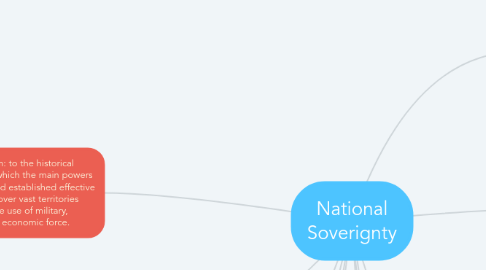National Soverignty
by Pablo Alv

1. Sovereignty: Sovereignty is the supreme political power that corresponds to an independent State, without external interference.
2. Colonialism: Colonialism is a situation in which a country dominates a foreign territory. Thus, it exercises political, economic and cultural power.
3. Imperialism: to the historical period in which the main powers of the world established effective dominion over vast territories through the use of military, political or economic force.
4. Hard Power: Hard power thus describes the ability of a state or political agent to use economic incentives or military force to influence the behavior of other actors.
5. Hegemony: a group of nations can exercise hegemony because they are important economic, political or military powers.
6. economic imperialism: refers to the economic analysis of apparently non-economic aspects of life, such as crime, law, family, prejudice, tastes, irrational behavior, politics, sociology, culture, religion, War, science.
7. political imperialism: It is the political doctrine that defends the domination of a people based on the power of another superior State.
8. Regime change:it is the replacement of one political regime by another.
9. Cultural imperialism: all forms of ideological imposition developed through the media and other forms of cultural production in order to establish the values of a dominant society in a certain peripheral or dependent society.
10. New imperialism:It was a policy and ideology of colonial expansion and imperialism adopted by the European powers and later by the United States and Japan.
11. Soft Power: is a term used in international relations to describe the capacity of a political actor, such as a State, to influence the actions or interests of other actors using cultural and ideological means.
12. aid conditionality:It is an inherent element of international cooperation, which in its elementary acceptance consists of a mechanism that aims to create a framework of conduct among the cooperating partners.


